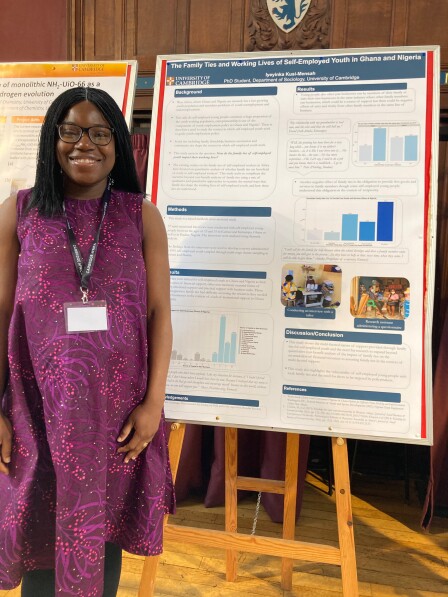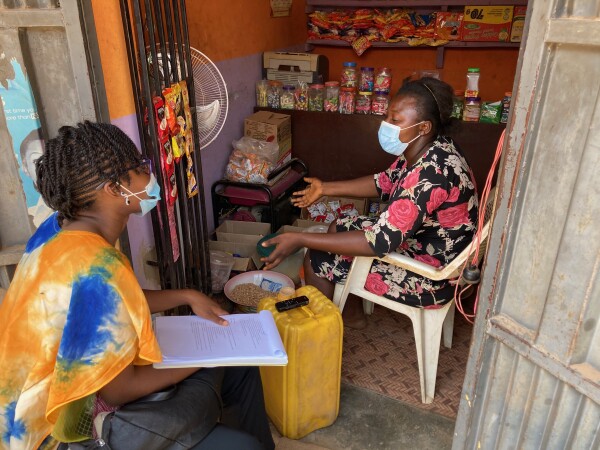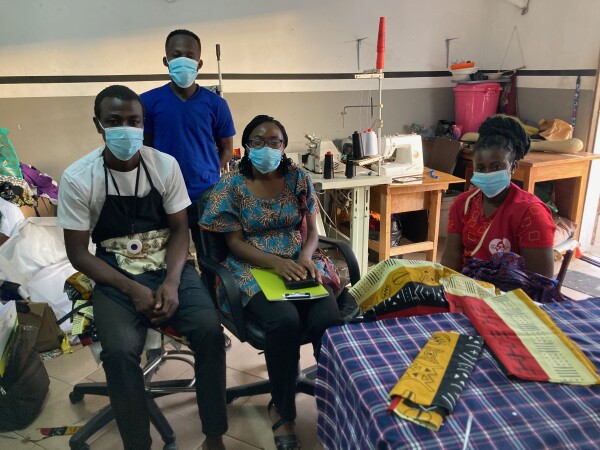My PhD Marathon

By Iyeyinka Kusi-Mensah
I arrived in Cambridge for the first time on a sunny Saturday afternoon in late September 2018 to start my MPhil in Sociology. I, a Nigerian girl, had gotten married just six weeks before to a Ghanaian man. I had left my family in Ibadan, Nigeria and spent the last couple of weeks in Kumasi, Ghana and now had just made another move to the UK after tearful goodbyes. I got off at Parkside Bus station, homesick and confused on how to get to Trinity College. I couldn’t see any taxis around. I asked some passersby how I could get to Trinity. A kind person helped me call a taxi. Trinity College felt majestic and grand, and I felt a bit small in it. It took me a while to find my place in Cambridge. I was studying at this 800-year old institution with its own vast history and many traditions. It was quite different from the ancient city of Ibadan, Nigeria I had grown up in and from Harvard University in Cambridge, Massachusetts where I had spent four years pursuing my bachelor’s degree. I felt different from most of the other students and found it difficult sometimes to follow cultural referents and jokes in conversation. This new cultural experience was an education, which now in hindsight, I am very grateful for. But that didn’t remove the feelings of homesickness I sometimes felt at first.

Iye with the other Cambridge-Africa Scholars
The African Society of Cambridge University (ASCU) became a home for me in Cambridge. I remember attending my first event of the society in October 2018 and feeling like I had found my people. I decided to apply to join the ASCU executive and served as the Know Your Africa Quiz Chair in the 2018/2019 academic year. I organized regular quizzes to bring the African community together to relax, have fun and take a break from the stresses of Cambridge. In the 2019/2020, I had the opportunity to serve as the President of ASCU and the Chair of the organizing committee of the Africa Together Conference. I enjoyed bringing the African community together for various fun events including formal dinners, discussion sessions, and bops. That year, we hosted a Adeyemi Michael, a filmmaker, and the Democratic Republic of Congo Minister of State for International Cooperation, Regional Integration and Francophonie, Pépin Manjolo. We also worked hard towards planning the 2020 Africa Together Conference “Investing in Young People: Building Africa’s Human Capital and Future” but the conference was not to be because the COVID pandemic struck at the beginning of 2020 sending the world into confusion and lockdown.
During the lockdown, the regular Zoom meetings for the Cambridge-Africa scholars organized by Late Amit Bhasin, the Cambridge-Africa Programme Manager, became a source of comfort. Although we couldn’t meet in person, it was nice to be able to chat on Zoom with other scholars and find out about how everyone was getting on in the disorienting pandemic world. When we were able to get back together in-person, I enjoyed being able to meet with the other Cambridge-Africa scholars at formal dinners and other relaxing events. At the 2022 Cambridge-Africa Day, I was able to present a poster of my PhD findings on how family ties shape the working lives of self-employed young people in Ghana and Nigeria, which was a great opportunity to synthesize some of the research I had been doing for the past four years.

Iye presenting a poster on her PhD at the Cambridge-Africa Day
Another important aspect of my Cambridge experience was being able to grow in my faith. I joined Holy Trinity Church. I had opportunities at the church and the Universities and Colleges Christian Fellowship (UCCF) to attend programmes where I could think through how my faith intersects with my work, which helped put a global perspective to my research when sometimes it was hard to see beyond the weeds of data analysis in R. I also became a part of a church homegroup and had the opportunity to form bonds with people outside the University of Cambridge community while deepening my understanding of the Bible.
I will forever be grateful for the intellectual feast that I was exposed to at the University of Cambridge. During my MPhil year and the first year of my PhD, I was able to take so many different courses ranging from text mining in python to diary methodology. I sat in on seminars on topics vastly different from my area in the sociology of work and employment which helped to broaden my perspective. Despite the breadth of opportunity, studying with some of the most intelligent scholars and students in my field helped me develop a rigorous approach to research. My supervisor, Prof Brendan Burchell, taught me how to look at the world and data with a critical eye to ensure whatever findings I present are properly grounded in evidence. His meticulous approach to research pushed me to do the very best work in my PhD.
My PhD research topic focused on how the social networks of self-employed young people in Ghana and Nigeria shape their transition into self-employment and their working lives. This topic emerged based on my interest in contributing to solve the youth employment challenge in Africa of few and poor-quality jobs available to young people. I spent the first year of my PhD diving into the literature and refining my research proposal with the hope that towards the end of the first year, I will be able to head out to the field. I was planning to conduct interviews with self-employed youth in Ghana and Nigeria to find out in-depth about how their networks impact their work experiences and follow this up with a survey on a larger sample of young people. When the pandemic struck at the beginning of 2020, I faced months of uncertainty about whether I would be able to conduct the fieldwork I had been planning to do all this time. I wrote two alternative proposals for ethical approval with one proposal based on being able to pursue in-person fieldwork and the other on remote fieldwork. Fortunately, the health impacts of the COVID-19 pandemic in Ghana and Nigeria were not so severe that I received approval to commence fieldwork in October 2020.

Iye conducting fieldwork in Ibadan, Nigeria
I conducted interviews with young people and enjoyed learning about the different network influences in their lives including nuclear and extended family, business associations, religious organizations, friends and the positive and negative impacts they have on their work. Conducting my fieldwork just a couple of months after the pandemic lockdowns had been lifted in Ghana and Nigeria, I also saw firsthand the severe impacts it had on self-employed youth many of whom depend on their daily wages to be able provide for themselves and their families but had been unable to go out to work or had experienced reduced working hours. These findings provided inspiration for a grant proposal I co-developed with researchers in the Centre for Child and Adolescent Mental Health, College of Medicine, University of Ibadan and McGill University as well as with self-employed young women and policymakers focused on co-developing solutions to improve the resilience of self-employed young women in Nigeria in the face of significant life events like pandemics. I have pursued my post-doctoral training on this project.

Iye conducting fieldwork in Kumasi, Ghana
Above all, I enjoyed walking on this PhD journey with my partner in life, Kwabena. Although we were apart my first year in Cambridge, Kwabena was able to join me in 2019, and we started our PhDs together and defended within two days of each other in March 2024. I was lucky that on the tough days, I had someone to gripe with and on the happy days, I had someone to laugh with. We had our first child on the PhD journey. Fortunately, the baby came after I had completed data collection and was completing the writing of my dissertation. Still, we had to seriously tag team to make it work. But we did by the grace of God and with the help of so many others. My mother came to stay with us a while after we had the baby. Friends brought food and cheer. Members of my extended family took turns to carry my baby while I wrote my dissertation. My brother, Akin, proofread my entire dissertation. I received so much encouragement from the Cambridge-Africa staff and from my supervisor. Trinity College provided financial support which helped to cushion the costs of having a child. A PhD is a marathon that requires a lot of resilience to run. Resilience not only from within but the resilience you get from the people who carry you. I am thankful to God and all those who carried me to the end.

Iye celebrating her graduation with her family

